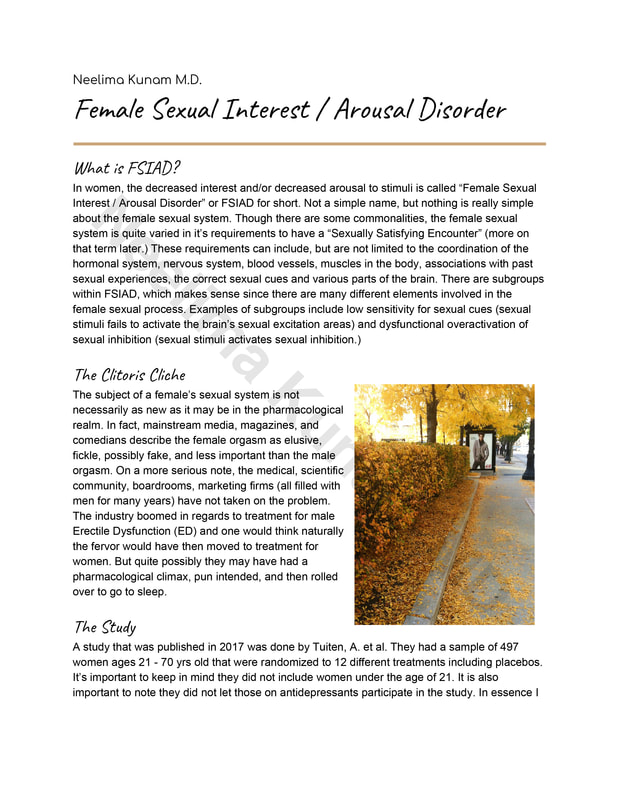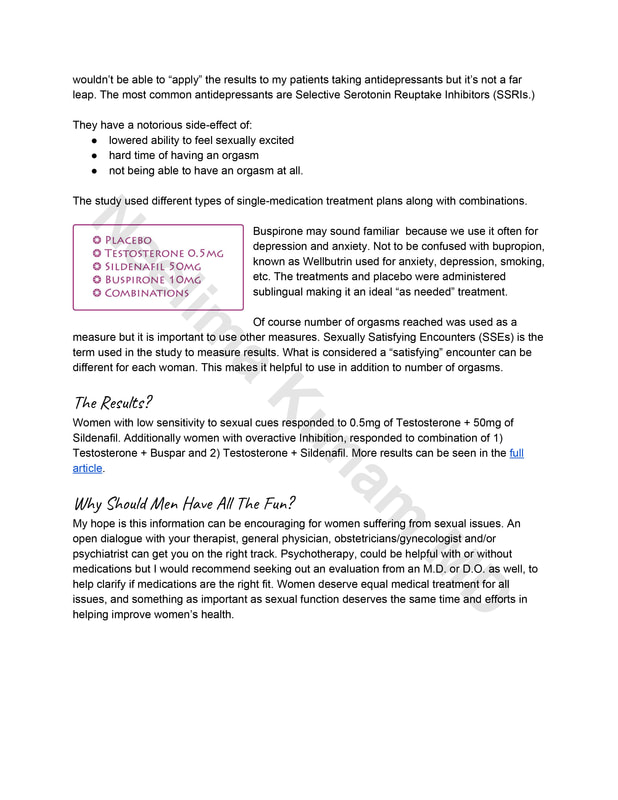|
0 Comments
 Chrissy Teigan makes a great point in her Glamour article. She has an ideal, if not amazing life, and why should she, of all people, find herself suffering from depression? The truth is depression does not always occur when circumstances are poor or difficult. Yes it’s more often that one may be sad or upset, when things are not going well, when the going gets tough, etc. But this miseducation/lack of education or incorrect attitude towards depression can lead to a delay in obtaining an evaluation and seeking out treatment, as it did for Ms. Teigan aka Mrs. John Legend. She opened up about her post-partum depression after letting herself accept that she could too suffer from this disease. So let’s delve into why depression can happen even to the most wealthy, most blessed people. It helps to understand how we are using the word “depressed” or “depression.” By medical definition it has to last for atleast 2 weeks and occur most days or most of the time for most days. So a sense of sadness for a day, having an off day, taking the day off to rejuvenate, wouldn’t necessarily be accurately described as having depression. Not to say these can’t occur in Major Depressive Disorder, but like i said, there are many requirements for this diagnosis. Depression may not always include the feeling of sadness, but can include the inability of not being able to enjoy things one once enjoyed regularly. And this is theoretically caused by an imbalance of serotonin, which is a neurotransmitter that gets sent from one brain cell to the next to communicate onwards to other brain cells to essentially make sure the cells are handling emotions the best that they possibly can. The more serotonin you can make or keep in the brain helps more brain cells communicate better. What causes depression? It’s often a combination of things, in addition to genetic susceptibility. We often say “nurture vs nature” in medicine in general, but now we say nurture AND nature. How does your environment nurture you, and how much does it attack you? And how much genetic risk do you have to begin with when you were created in your mother’s womb that might be exposed with the environment?
Then we look at protective factors. These balance out the negative, hopefully enough to protect you from developing depression. When protective factors outweigh the negative factors, you may not develop depression despite going through some harrowing trials and tribulations.
Ofcourse there are many other specific individualistic factors that can be negative or protective. Seeking out an evaluation with a Psychiatrist can help guide you to the right type of treatment, whether that is therapy, or medication, or the combination of therapy and medication. {These are my own opinions. For educational purposes only. This information does not replace the need for a psychiatric evaluation by a health care professional.} Image Credit: www.justjared.net Glamour: https://www.glamour.com/story/chrissy-teigen-postpartum-depression  When did it become common to describe someone “Bipolar?” How can you know if someone is bipolar or not? There’s a definition, and it’s usually not what you think it is. Often, personality disorders, are in fact the accurate diagnosis instead of the casual “she’s so bipolar!.” What bipolar is NOT:
Consider that a true Bipolar “Mood Swing” requires a minimum of 1 week. Not hours, minutes, or seconds. As you can see, the diagnosis of Bipolar needs a professional, usually an M.D. or D.O. that trained in medical school and then did a four year residency in Psychiatry (Behavioral Health.) Nurse Practitioners, Physician Assistants, Social Workers, Therapists/Psychologists and Family Doctors can also diagnosis the disorder but their ability to make a diagnosis will vary quite a bit on their training and experience. Generally a D.O. or M.D. Psychiatrist will be the authority on the matter if there is a question on the diagnosis. Sometimes a diagnosis can’t be made in a 50 minute evaluation. Sometimes we need family or friends accounts of how one has behaved over the years to help piece together the diagnosis. Often, those afflicted with bipolar, do not remember the severity or details of how they were when they were in a certain “swing.” Whether it be Mania or Depression. And let’s not forget the stigma attached to being “Bipolar.” Does this render one incompetent or “crazy?” Does this mean you lose the respect of others, and people might roll their eyes in your direction? Does this mean you might not get a job, or let’s say keep a job? We cannot ignore the fears many have in being diagnosed Bipolar. This is enough to stay away from the doctor’s office for many. Despite the stigma, it’s important to know that being diagnosed leads to being under the care of a psychiatrist, going to appointments, figuring out the medication that works the best with the least amount of side-effects. This is actually the key to keeping that job, staying in control of your life, and maintaining self-esteem required to live a life with the diagnosis of Bipolar. Becoming healthy again and preventing further “swings” can help one maintain a very fruitful and content life, minimizing the distressing effects of an unmedicated bipolar episode. Bravo to television shows, such as Homeland, which broaches the subject head on. The HBO show depicts how the intelligent (no pun intended) CIA agent Carrie Mathison can be only be successful with the aid of medications and stopping medications can cause her to spiral out control. In real life as well, many people are able to have family, children and careers while preventing the spiral by using medications and being under the care of a Psychiatrist. This information does not replace the evaluation of a professional. You should seek out medical attention if suffering from symptoms of a mental illness. These are my own opinions.
 What is Depression? Symptoms CAN but do not HAVE to include:
Severe Depression may include:
Serotonin Serotonin is a neurotransmitter that we naturally have in our brain. Cells in our brain use serotonin to help regulate our mood and anxiety. Having enough serotonin helps our brain cells regulate our mood. Not having enough serotonin have hinder how well we can regulate our mood. That means it can be harder to recover from feeling sad. Sadness is a normal emotion and part of the human experience. But the ability to regulate sadness and recover from sadness, partially relies on Serotonin. Selective Serotonin Reuptake Inhibitors (SSRIs) such as Prozac, Zoloft, Lexapro, Celexa and Paxil, help keep Serotonin in the synapse between brain cells, to help brain cells restore our mood better. Prozac is the brand name for Fluoxetine Zoloft is the brand name for Sertraline Lexapro is the brand name for Escitalopram Celexa is the brand name for Citalopram Paxil is the brand name for Paroxetine It is important to meet with a Psychiatrist (MD or DO) to discuss whether you have depression and if a medication can be helpful for your depression. Medications often work better when talk therapy is also part of the treatment plan. Often you can get an appointment with a talk therapist (aka psychotherapist) first while waiting for an appointment with your Psychiatrist. Nurse Practitioners and Physician Assistants may refer to themselves as doctors, but do not have the same amount of training (usually 10% the amount of hours an MD/DO has.) They can help you start on the right path, or if working closely with a physician can help you decide on a medication. You can also see your PCP to get started on these medications while waiting for an appointment with a Psychiatrist to continue the management of a medication. For educational purposes only, and not to replace a personalized evaluation with a physician psychiatrist. Seasonal Affective Disorder (SAD) is likely at its highest during this season. There are treatments that are helpful for the depressive symptoms that occur during these harsh, bleak winter months. Light Therapy or a Light Box is helpful when used correctly. Recommendations usually include 10,000 LUX, using it first thing in the morning, used for 15 minutes, and for the light to be placed approx 14 inches away from the face. (This information is for educational purposes and should not replace the evaluation and recommendations by your personal physician/doctor/provider. Please seek medical treatment if you think you suffer from SAD.)
As many as 33% of women noticed their first OCD symptoms during pregnancy or postpartum. This doesn't just mean, symptoms of hand washing 10 times in a row like many movies or tv shows portray (obsessive compulsive disorder) OCD. This could mean scary or intrusive thoughts that are hard for the mother to shake off. These thoughts can be very distressing, and don't equate to any intention on carrying out the thought. Often just trying to get rid of the thought is so difficult, the stress from this can lead to clinical depression. Seek out medical treatment if this sounds familiar.
Women's Mental Health can be a confusing, emotional and overwhelming topic to tackle. This blog hopes to bring attention to new information, old information and everything in between.
|
AuthorNeelima Kunam M.D. is a Board Certified Psychiatrist that practices in the Midwest and also has a California Medical License for Telemedicine. Archives
April 2020
Categories |
||||||




 RSS Feed
RSS Feed